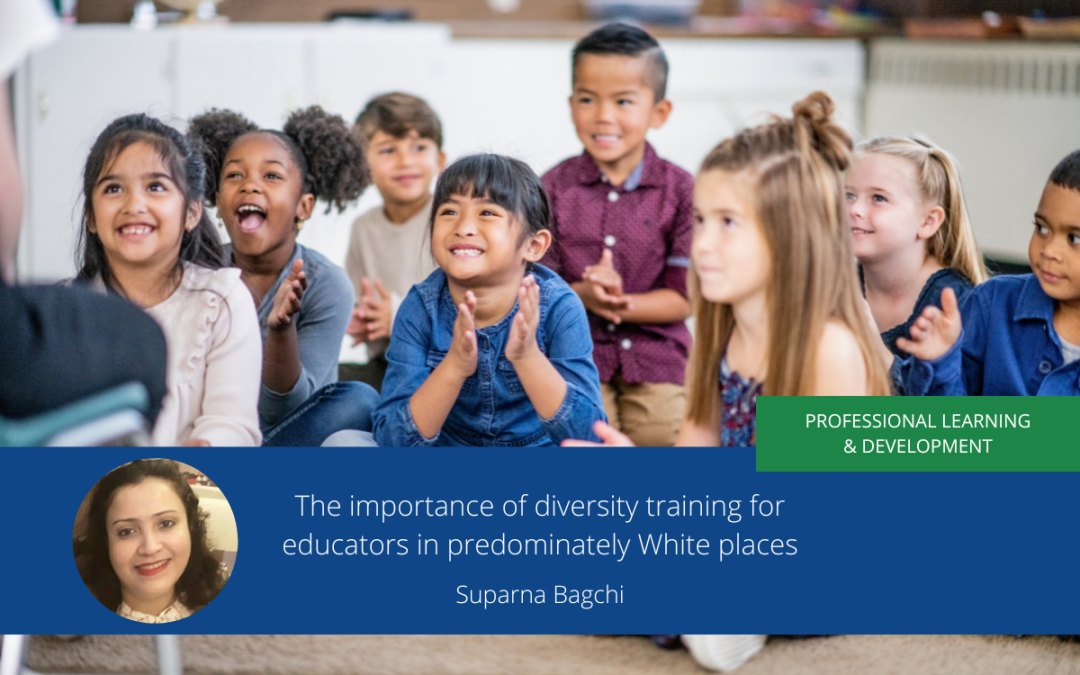The state of future education as a discipline will be possibly influenced by the importance it places on a conceptual, curricular, and pedagogical need to shift the emphasis toward transformative classrooms working for positive change through cultural diversity (Banks, 2020). Awareness of issues around race equality, inclusive growth, and community cohesion has heightened following George Floyd’s killing in the USA in 2020, and the Black Lives Matter Movement. This increasing awareness is particularly pertinent in Britain in areas of historically low ethnic diversity which have lately experienced a rise in ethnic minority populations, and where inclusive growth is a challenge.
The Research
My research explores the understanding and experiences of multiculturalism of students, parents and educators in four mainstream primary schools situated in the predominantly White South-West England. I adopted a qualitative case study methodology framed by a sociocultural theoretical framework (Vygotsky, 1978). Data were collected through semi-structured interviews with adult participants, observation of students’ classroom activities, and documentary analysis of classroom and corridor displays.
The interviews had questions around books and topics reflecting multiculturalism. In the height of COVID-19, the classroom and corridor displays were photographed to see whether the school ethos and atmosphere reflect multiculturalism.
Background – Diversity, Curriculum and Education Inspectorate
Although 33.5% of the school population includes ethnically diverse children, out of 6478 children’s books published in Britain in 2019, 10.5% featured characters belonging to Black, Asian and Minority Ethnic communities; of these, only 5% had a main character who belonged to the communities mentioned (Wood, 2019). The education inspectorate, Office for Standards in Education, Children’s Services and Skills or in short, Ofsted (2019:11,12) is vocal about ensuring “inclusive education and training to all”, and extending the Curriculum beyond the academic and technical domains for students’ broader development, and creation of understanding, and appreciation of cultural diversity. However, race equality and community cohesion, which could help in the students’ broader development, do not constitute Ofsted’s school inspection criteria (Rhamie, 2014).
Findings
My research findings suggest participants’ eagerness for more ethnically diverse content incorporated in teaching and learning. However, schools are considerably dependent on, and somewhat confined by, the knowledge-focused Primary National Curriculum in England for which efforts towards a multicultural reflection are less noticeable. The absence of culturally diverse content in the school Curriculum highlighted by the 1985 Swann Report and the 2007 Ajegbo Report makes England’s primary National Curriculum look like a “Brexit policy three decades before Brexit” (Moncrieffe et al., 2020:20). The situation emphasizes the need to start afresh. The starting point may be to get thinking and acting while doing Curriculum making (Priestley et al., 2021). This is because Curriculum thinking is at the heart of education practice today (Poutney and Yang, 2021).
Implications – Curriculum thinking and teacher training
The educators as Curriculum framers play a significant part in Curriculum thinking and delivery where the task design is crucial, and where the educators can place equal importance on the interwoven elements of “how”, “what” and “why” the task is taught (Moncrieffe et al., 2020:16-17). The educators need to build confidence in encouraging difficult conversations around racism, fear, indifference, and ignorance breaking the stereotypical barriers. This would help equip the students with the necessary creative skills so that they learn, grow and foster as responsible citizens in this changing complex world (Deng, 2022) with an apt cognition of a multicultural Britain. But how can they train students without the required training in the specific area?
Lander’s research (2014) showed that trainee educators in predominantly White areas often run the risk of sharing confined perspectives while educating children. I agree with Lander that no matter the geographical location, school educators can be equipped with the necessary culturally responsive initial training, and continuous professional development, with a focus on race-centric and multiculturally responsive education (ibid). This may aid in the reduction of employees’ unconscious bias for which the CRE (2021) recommended training and routine skills assistance. This becomes distinctly pertinent to avoid horrific cases of racism in the future like the one in Hackney, London where a Black teenager referred to as Child Q was wrongly suspected of cannabis possession, and strip-searched during her period, risking deep serious consequences for the child (FordRojas, 2022 ).
Having competent culturally responsive educators in 21st century classrooms may have important positive effects like boosted self-esteem, improved academic achievement, and greater engagement and well-being of students from ethnically diverse communities, which, in turn, have implications for fostering nurturing inclusive classrooms and school environments.
Key Messages
- There is often a misconception that only schools with high ethnic minority populations or those situated in multicultural places need multicultural awareness.
- Race equality and cultural awareness are essential topics amidst racist incidents in multicultural schools at the heart of London
- These topics are equally important in predominantly White places in Britain, especially in the aftermath of George Floyd’s murder, the BLM movement, and post-Brexit rises in racist and xenophobic attacks.
- School curriculum and atmosphere need to offer race sensitive multicultural reflection in these places.
- Practitioners need training and preparedness to equip them with relevant knowledge, skills, and confidence.

Suparna Bagchi
Final year doctoral student in Plymouth Institute of Education, University of Plymouth, UK
Suparna Bagchi is a final-year doctoral student at the Plymouth Institute of Education, University of Plymouth. She worked there as a Doctoral Teaching Assistant from 2019 to 2022. Suparna’s doctoral research explores perceptions of multiculturalism in mainstream primary schools in South West England. With a research interest in race, equity and social justice, Suparna is a member of various race equality associations both inside and outside the University.
Suparna is a dignity and respect ambassador and student representative of Equality, Diversity and Inclusion (EDI) at Plymouth University. In 2022, Suparna received EDI Award from Plymouth University coming among the top three students. Suparna is a trained Compassionate Community Ambassador, mentor of the UNO-recognised Virtues Project, a certified Community Champion and trained Hinduism Faith Speaker. Suparna appears regularly on BBC Radio Devon as a guest speaker. Suparna has made academic presentations nationally and internationally.
Twitter handle: https://twitter.com/suparnabagchi2?lang=en-GB
Orcid: https://orcid.org/0000-0002-2498-2892
ResearchGate: https://www.researchgate.net/profile/Suparna-Bagchi
Other blog posts on similar topics:
Banks, J. A. (2020). Diversity, transformative knowledge, and civic education: Selected essays. Routledge. https://doi.org/10.4324/9781003018360
Deng, Z. (2022). Powerful knowledge, educational potential and knowledge-rich curriculum: pushing the boundaries. Journal of Curriculum Studies, 54(5), 599-617. https://doi.org/10.1080/00220272.2022.2089538
FordRojas, J.P. (2022). Child Q report: Met Police culture ‘under scrutiny again’ after case of schoolgirl strip-searched by officers, says policing minister. Sky News. 13 April. https://news.sky.com/story/child-q-report-met-police-culture-under-scrutiny-again-after-case-of-schoolgirl-strip-searched-by-officers-says-policing-minister-12572253
Lander, V. (2014). Initial teacher education: The practice of whiteness. In R. Race. and V. Lander (Eds.), Advancing race and ethnicity in education, (pp. 93-110). Palgrave Macmillan.http://www.palgrave.com/us/book/9781137274755
Moncrieffe, M., Race, R., Harris, R., Chetty, D., Riaz, N., Ayling, P., Arphattananon, T., Nasilbullov, K., Kopylova, N. and Steinburg, S. (2020). Decolonising the curriculum. Research Intelligence, 142, 9-27. British Educational Research Association. https://www.researchgate.net/publication/340870420_Decolonising_the_Curriculum_-_Transnational_Perspectives_Research_Intelligence_Issue_142Spring_2020
Ofsted. (2019). The education inspection framework. Draft for Consultation–January 2019.
https://www.gov.uk/government/publications/education-inspection-framework-draft-for-consultation
Plymouth Report. (2019). Plymouth: Plymouth City Council.https://www.plymouth.gov.uk/publichealth/factsandfiguresjointstrategicneedsassessment/plymouthreport
Pountney, R. and Yang, W. (2021). International perspectives on the curriculum Implications for teachers & schools. BERA Research Intelligence, 148, pp. 15 https://www.bera.ac.uk/publication/autumn-2021
Priestley, M., Alvunger, D., Philippou, S., and Soini, T. (2021). Curriculum making across European nations. BERA Research Intelligence,148, 16-17. http://hdl.handle.net/1893/33293
Rhamie, J. (2014). Resilience, the black child and the Coalition Government. In .R Race, and V. Lander (Eds.), Advancing Race and Ethnicity in Education (pp. 230-249. Palgrave Macmillan. https://doi.org/1057/9781137274762_15
Sewell, T., Aderin-Pocock, M., Chughtai, A., Fraser, K., Khalid, N., Moyo, D., … and Shah, S. (2021). Commission on race and ethnic disparities: The report. Commission on Race, Ethnic Disparities. https://assets.publishing.service.gov.uk/government/uploads/system/uploads/attachment_data/file/974507/20210331_-_CRED_Report_-_FINAL_-_Web_Accessible.pdf
Vygotsky, L. S., and Cole, M. (1978). Mind in society: Development of higher psychological processes. Harvard university press.https://doi.org/10.2307/j.ctvjf9vz4
Wood, H. (2019). New CLPE report into kids books warns over simplified depictions of BAME characters. The Bookseller. https://www.thebookseller.com/news/clpe-reveals-increase-bame-representation-urges-against-jasmine-default-1085896

